J.K. Rowling
Books: Fantasy | YA
Harry Potter and the Sorcerer’s Stone (1998), Harry Potter and the Chamber of Secrets (1999), Harry Potter and the Prisoner of Azkaban (1999), Harry Potter and the Goblet of Fire (2001), Harry Potter and the Order of the Phoenix (2003), Harry Potter and the Half Blood Prince (2005), Harry Potter and the Deathly Hallows (2007)
The Harry Potter Books
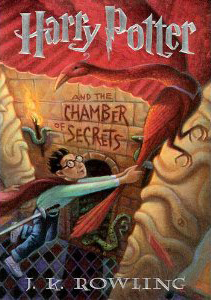
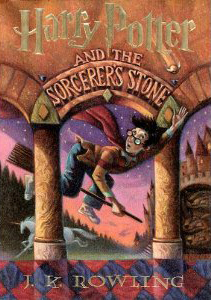 I finally read the Harry Potter books, and they were good. (You know how it is, people tell you something is great and you build up your expectations and are always disappointed) but in this case everyone was right. They are good. Took me about a day to read all four books, but then I am a fast reader. What struck me was, first, that the books were quite good. I'm not sure why that surprised me, but it did. Though I was quite pleased to be surprised. Second was that those who are protesting that these books are going to destroy the moral fiber of today's children are totally and completely wacked out. I mean, we were looking at a basic battle between good and evil, and Harry Potter is quite obviously on the side of good. Just further reinforces my concept of the Christian right (which is neither, mind you) as being completely against anyone having fun at all.
I finally read the Harry Potter books, and they were good. (You know how it is, people tell you something is great and you build up your expectations and are always disappointed) but in this case everyone was right. They are good. Took me about a day to read all four books, but then I am a fast reader. What struck me was, first, that the books were quite good. I'm not sure why that surprised me, but it did. Though I was quite pleased to be surprised. Second was that those who are protesting that these books are going to destroy the moral fiber of today's children are totally and completely wacked out. I mean, we were looking at a basic battle between good and evil, and Harry Potter is quite obviously on the side of good. Just further reinforces my concept of the Christian right (which is neither, mind you) as being completely against anyone having fun at all.
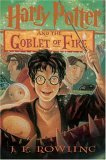
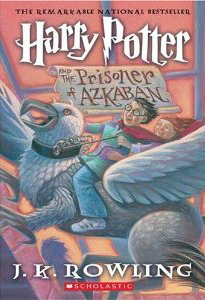 That aside, the books are very good, although there were a couple of plot problems that mildly bugged me, but would certainly not be a distraction to a young adult (or whatever they are calling teen and pre teen readers now), or, to be honest, most adults, since I have found that typically only I tend to be bothered by some details (after all, everyone else loves Michael Crichton, while his books grate on my nerves). Issue one, why are British children smart enough to figure out what a Philosopher's Stone is, but American children are not, and so the made up term "Sorcerer's Stone" has to be used instead? I realize that this is not the fault of the author, but it bugs me. (I wonder what else British was changed for the American edition, and more interestingly, why the term "git" hasn't suddenly become popular with American youth? (or has it, and I'm too out of the loop to know?)
That aside, the books are very good, although there were a couple of plot problems that mildly bugged me, but would certainly not be a distraction to a young adult (or whatever they are calling teen and pre teen readers now), or, to be honest, most adults, since I have found that typically only I tend to be bothered by some details (after all, everyone else loves Michael Crichton, while his books grate on my nerves). Issue one, why are British children smart enough to figure out what a Philosopher's Stone is, but American children are not, and so the made up term "Sorcerer's Stone" has to be used instead? I realize that this is not the fault of the author, but it bugs me. (I wonder what else British was changed for the American edition, and more interestingly, why the term "git" hasn't suddenly become popular with American youth? (or has it, and I'm too out of the loop to know?)
Harry Potter and the Order of the Phoenix (2003)
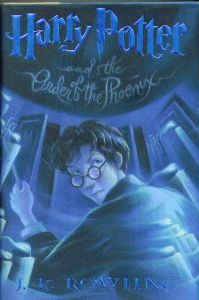 I have to say I am very pleased. I think she did a fantastic job of tying together some of the things that struck me as loose ends in the previous books, as well as explaining some of the small details that seriously bothered me from the previous books. Things that made me go "why on earth would someone do THAT?" become more clear in this book.
I have to say I am very pleased. I think she did a fantastic job of tying together some of the things that struck me as loose ends in the previous books, as well as explaining some of the small details that seriously bothered me from the previous books. Things that made me go "why on earth would someone do THAT?" become more clear in this book.
I think she has also done a very good job of humanizing some of the peripherial characters, especially Snape. I found him somewhat frustrating in the earlier books, and I think learning more about him significantly improved the series.
I am very curious, however, as to how a young person reacts to the changing characterizations. I read this book from an adult perspective, and although I can remember what it was like to be younger (and in parts irrational, especially since I still suffer in great part from bouts of irrationality) I read the books through the filter of someone who managed to survive to adulthood--older if not necessarily wiser--and with far more experience. Not that it makes how I read better or worse, but it is different.
I'm trying to remember off-hand, re-reading a book later in life, from a different perspective, but what I remember reading most vividly when younger are books that I don't think would be read significantly differently from an older vantage point: Sherlock Holmes, The Hobbit, and Agatha Christie don't really seem to allow for the shifting perspectives that come with age. And of course I re-read those books time and time again, so I don't think I would have noticed a shifting perspective if there was one. I don't remember vividly enough how I felt about the books that I might read differently now, such as Roots, The Odessa File, James Baldwin, so although I'll enjoy them if I read them again, I don't think it will answer my question.
But of course each individual has their own perception, so it's probably moot point, but that won't stop me from wondering.
Harry Potter and the Half Blood Prince (2005)
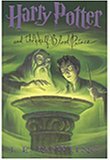 Finished.
Finished.
And grr...
I liked the book up through the last couple chapters. Then it went exactly where I thought it was going to go. And I'm not happy about it.
Also, this had all the feel of a second book in a trilogy--minor points are resolved, but for the most part everything is left hanging, waiting for the final book.
I hate that.
Everything else I have to say is going to contain spoilers, so don't read on if you haven't already read the book and don't want to know important plot points.
BEGIN SPOLIERS
The second chapter gave me an inkling that I wasn't going to like where things were going to go in this book. About halfway through I was becoming more and more certain I was going to be really annoyed. And I was.It didn't bother me that Dumbledore was going to die. In fact, I quite liked the way that J.K. Rowing made his death meaningless--he was weakened retrieving an already destroyed artifact. However I'm really unhappy that she had Snape--SNAPE--kill Dumbledore. I knew it was going to happen--the second chapter made that pretty clear--however I kept hoping that Harry was going to find a letter from Dumbledore describing how he had conspired with Snape in his own death. That Snape was going to kill Dumbledore to save Malfoy.
But no. No redemption.
I realize, of course, that this could be the major discovery of the last book--that Snape didn't betray Dumbledore. But for now... I'm not happy. One of the things I really liked about the books was fact that despite Snape's unpleasant and unsavory past, and despite his unpleasant character and nature, he had been redeemed (so to speak).
I loved the idea of redemption, and the idea that Snape could be unpleasant, and in opposition to Harry, yet still be good. That those working for the wide of good did not all have to be alike--to be united in their cause. I liked the dissent, the difficulty, and the fact that everything was not completely black and white.
I'm still going to hope that she redeems Snape in the next book. That we discover that Dumbledore knew that Snape would have to kill him, to tighten the noose around Voldermont. But I don't have a LOT of hope.
I'm also not thrilled with Harry quitting school. Ms Rowling, in case you'd forgotten, this is a KIDS book, I thought we were trying to encourage kids to remain in school and finish their education?
I do have good things to say. Up to the last few chapters, I enjoyed the book (I read it in six hours, not even stopping to eat.) I thought she did a good job with the whole teenagers in love thing, and I liked the fact that Ron wasn't particularly well-behaved in the end of relationship with Lavender. That struck me as very much how things go with teenage boys, and I liked the fact that she didn't make him more than you would expect a teenage boy to be.
So, I didn't care for the cliffhanger, I hated the fact that it was Snape who killed Dumbledore, and I'm not thrilled with the fact that Harry is dropping out of school. But it also reads like the next to last book in a series, so perhaps some of the things that bother me will be resolved in the last book.
END SPOILERS
Michael is currently rereading Harry Potter and the Goblet of Fire. I can't wait until he finishes it and then reads Half Blood Prince so I can find out what he things.
Harry Potter and the Deathly Hollows (2007)
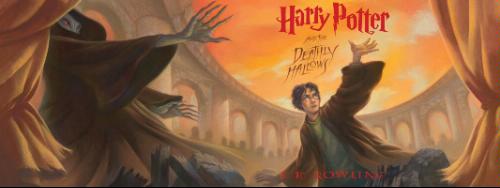 Seven and a half hours. Although not seven and a half hours straight, since there was a very large break in the middle to have dinner with my family. Which was good, because I had to hand it off to Michael, so hopefully he’ll be able to finish before the weekend is over.
Seven and a half hours. Although not seven and a half hours straight, since there was a very large break in the middle to have dinner with my family. Which was good, because I had to hand it off to Michael, so hopefully he’ll be able to finish before the weekend is over.
The only thing I really want to say is that I am very pleased with the ending. Lots of people die, which isn’t necessarily a good thing, but is realistic thing. And the important things that I hoped would happen, did happen.
I saw some things coming, but that was okay, because there were only so many ways certain situations could be resolved, and I thought she did a good job of dealing with the things I presumed would be expected.
So yay for J.K. Rowling, I thought this was an excellent conclusion to the series, and–no offense–I hope that she refuses to write any more Harry Potter books. Because she did an excellent job here of concluding the story.
Rating: 8/10
